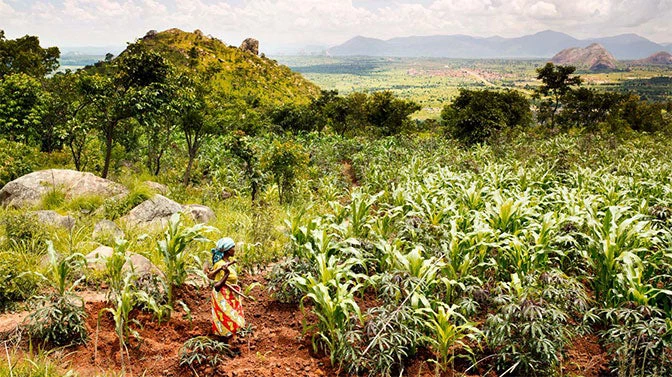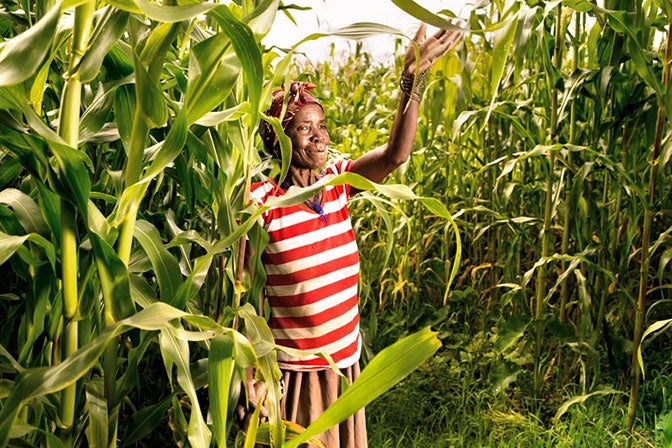
The challenges faced by small farmers are similar across the developing world – pests, diseases and climate change. Yet in Africa the challenges are even greater. If farmers are to survive at current rates (let alone grow), they need to have access to high-yielding seeds, effective fertilizers and irrigation technologies. These issues threaten the region’s ability to feed itself and make business-growth and export markets especially difficult to reach. Other factors include the rise in global food prices and export subsidies for exporters in the developed economies, which leave African farmers struggling to price competitively.
Organizations such as The International Finance Corporation (IFC) provide and mobilize capital, knowledge and long-term partnerships in agribusiness. It has provided over $25 billion in financing, mobilized investments from partners and provided advisory services across the continent. Connecting the private sector with global and regional NGO’s and the public sector is one of the most important steps. Of the $3.7 billion invested in Sub-Saharan Africa in 2015 by the IFC, $1.8 billion came from other investors.
Modernization of technologies, innovative technologies and widening access to markets is central to turning such huge sums of money into results. In Kenya, a mobile app called M-Farm allows farmers to directly send messages requesting guidance and data on crop prices. It also helps farmers to connect directly with food suppliers; thus reducing reliance on middlemen and market buyers. Cutting costs in this way can go some way to mitigating the impact of subsidized exports from the developed economies.
In Ethiopia, access to simple market knowledge has also helped small food manufacturers grow. AfricaJUICE is the first Fairtrade certified fruit juice in sub-Saharan Africa and it has been able to expand through the provision of technical expertise and understanding global markets and industry practices. This assistance came from the World Bank, alongside equity financing of $6 million.
Agribusiness is growing fast, yet the true potential is stymied by limited mechanization, fragmented markets, price controls and poor infrastructure. For a sector that contributes 25% to Africa’s overall gross domestic product (GDP) and accounts for 70% of all employment, it is an industry that presents enormous opportunities to investors.

For policymakers and investors, one of the hurdles is knowing how to find and identify those small-scale farmers or food manufacturers that have really strong commercial potential. In Angola, this challenge has been met by the creation of a state-backed organization called Fundo Activo de Capital de Risco Angolana (FACRA). It is a public venture capital fund that supports Angolan SME’s in agribusiness and other sectors in building, innovating and expanding their existing business. It opens doors for businesses that have the potential for growth and makes it significantly easier for investors to enter the Angolan market.
Aside from providing growth opportunities and support for market-entry, organizations such as FACRA also have a role to play in helping Africa to become self-sufficient in food and become a regional exporter. With 70% of the workforce already working in the sector, Africa already benefits from having a mobilized workforce. Honing in on communities that have such strong potential is one way of helping to support economic growth.
Like so much in Africa, things have to happen from the ground up, through investing in small projects and local communities. The financial and administrative burden for such initiatives very often fall on the government but the private sector has the ability to get involved at a local level too, if it can take a long-term view and work in partnership. The introduction of world-class machinery and support for the type of infrastructure needed for rural communities to succeed are two areas where foreign investors can take a stake through public-private partnerships (PPP’s) or direct investment.
Direct investment brings with it a range of financial incentives for foreign investors. Infrastructure linking rural communities to markets is much-needed. Mechanization is also particularly important in achieving greater production and capacity and so too are storage facilities and modern irrigation and water conservation technologies. These are all areas where investors can bring capital and technical expertise to an industry sector that has enormous economic potential.
As African economies continue to work against the tide of low oil and commodity prices, there is determination regionally and on the national level to achieve diversification and economic growth within the SME sector, not only in agriculture but all burgeoning sectors.
Agribusiness is especially important because of the scale of opportunity and the important role that it plays in supporting a wider value chain, job growth and economic diversification. Now is the right time for all African stakeholders, global bodies and private investors to come together and create an environment that helps Africa to feed itself and deliver economic growth for ordinary people, national economies and investors.


Join the Conversation